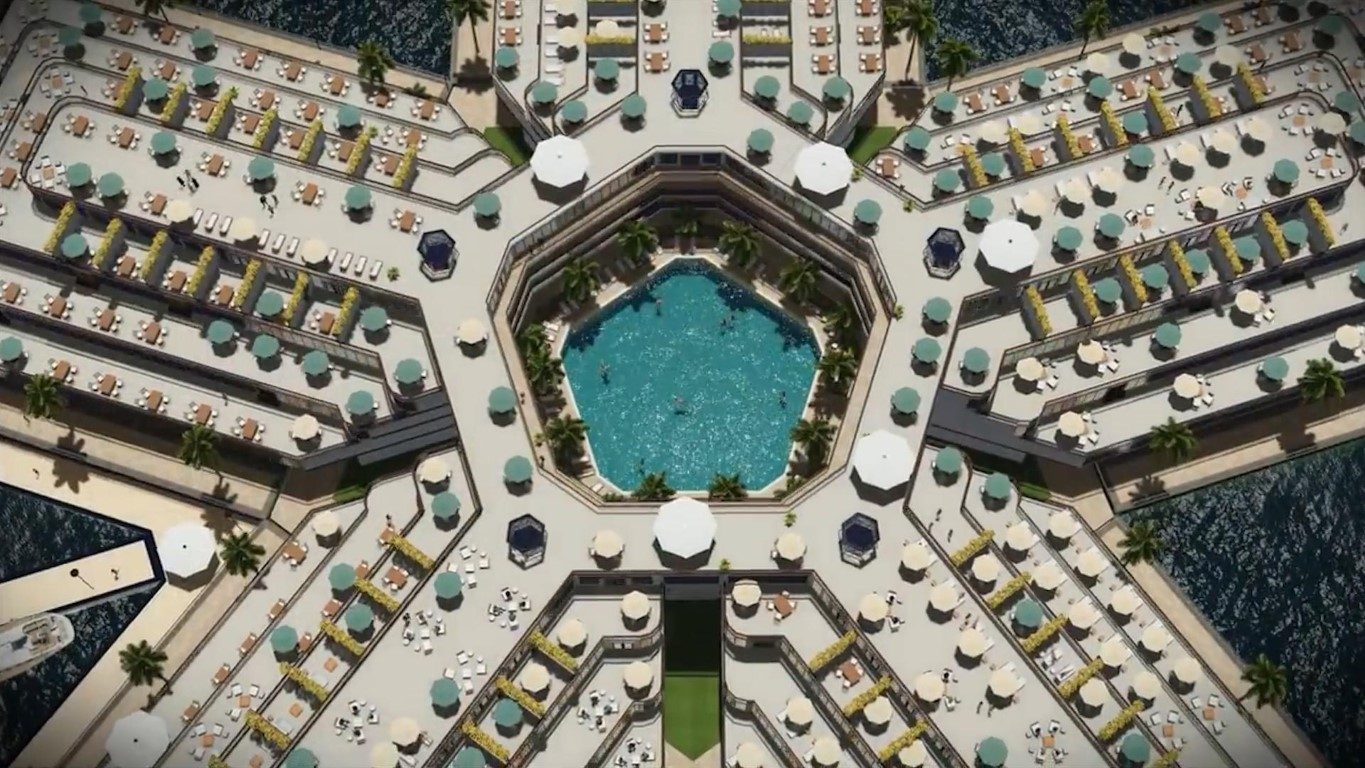Floating Nation
An independent floating nation is only a concept at this stage, but essentially, it’s a proposal for a cluster of floating pontoons tethered together to create a base for a community of like-minded individuals.Thanks to the geometric shape of the pontoons – pentagons and rectangles – they’re a bit like a floating jigsaw, easily arranged into different patterns to suit the specific needs of individual communities.
They could be established anywhere on the planet’s oceans, with the platforms oriented to the prevailing wind, to minimise the effects of the waves.
Typically, each of these sea-bound, city-states would feature 300 homes as well as a handful of hotels, restaurants and offices. It would also be equipped with aquaculture farms, healthcare and medical research facilities, as well as sustainable energy powerhouses. In other words, the inhabitants would be pretty much self-sufficient.
Floating in international waters and operating within its own laws, an island community would be ‘liberated from politicians’. And with a number of the buildings functioning as business centres, companies would be free from conventional government regulations and shackles. The island nations would even use a unique cryptocurrency – the ‘Vayron’.
Apart from the utopian appeal, the concept is also likely to resonate with countries/communities affected by global warming and rising sea levels. The artificial islands offer a lifeline to existing island nations – many in the South Pacific – where the prospect of homes disappearing under the waves is a real possibility.
Whose idea is this?
It’s the brainchild of a Dutch-based, non-profit organisation – the Seasteading Institute. It describes its members as a diverse, global team of marine biologists, nautical engineers, aquaculture farmers, medical researchers, investors, environmentalists and artists.

The Institute was co-founded in 2008 by Peter Thiel – the gent who set up PayPal – together with Patri Friedman, a software engineer and political economic theorist. He is also the grandson of Nobel Prize-winning economist, Milton Friedman.
Thiel has seed-funded the Institute to the tune of $1.25 million, and it’s estimated that the development of plans for the prototype island nation will cost around $50 million.
Institute president, Joe Quirk, wants to see ‘thousands’ of these rogue, floating cities by 2050, each offering different ways of governance. As you may have guessed, he has a dim view of politicians. “They just don’t get better. They’re stuck in previous centuries. That’s because land incentivises a violent monopoly to control it.”
In January last year a feasibility report into the floating island concept – by Dutch engineering firm Deltasync – proposed that the floating platforms would measure 50m in length, with 50m-tall sides to protect buildings and residents. It also calculated the price of each platform at around $15 million – similar to the price of land in London or New York.
The Institute has established a separate company – Blue Frontiers – a new start-up specialising in the actual construction of the floating islands.
Hiccup
The first of the prototype island nations was on track for establishment near Tahiti by 2022, in partnership with the French Polynesian government. Concerned about the dangers from rising sea levels to its 118 South Pacific islands, the government agreed to create a special economic zone, allowing the floating nation to operate under its own trade laws.
But after protests that the floating island would only cater to the privileged and wealthy, the government subsequently changed its mind. With this rejection, Seasteading and Blue Frontier have now developed a different strategy: a global competition offering $100,000 to any entrepreneur able to convince his/her government to host a nearby floating island.

To enter you have to obtain “a general letter of invitation from a government official” in your home country, together with photos and videos of the proposed floating island site. And you will have to pass a background check. The winner will be awarded 100,000 Vayron immediately, and a further US$100,000 once the prototype is built.
Hmmmm. Sounds interesting but could get a little lonely – and dicey for anyone with a delicate tummy. My biggest concern though is the lack of a golf course. Virtual golf just doesn’t cut it!
